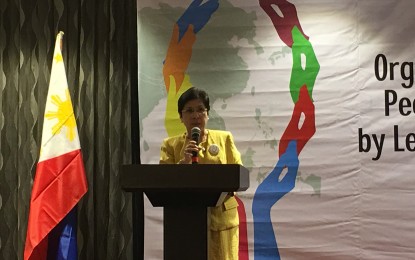
Department of Health Assistant Secretary, Dr. Ma. Francia Laxamana, says people affected by leprosy can be productive members of the society like other persons with disabilities, if they are given the chance. (Photo by Ma. Teresa Montemayor)
MANILA -- Organizations advocating for the care of people affected by leprosy gathered on Sunday for a regional assembly, aiming to put an end to the social stigma and discrimination and to push for their inclusivity.
In his speech, Culion Sanitarium and General Hospital chief, Dr. Arturo Cunanan Jr., said there had been significant decline in the number of leprosy cases in the country after improvements on the public health measures for leprosy control have been implemented in 1982.
"Today, there is a greater challenge of timely detection of new cases of leprosy under low level of endemicity, occurring unevenly in the population and in the pockets of areas even in previously endemic countries. The distribution is further affected by the lowering priorities and interest from medical, public and private sectors in providing quality and accessible leprosy services," he said.
For his part, Coalition of Leprosy Advocates of the Philippines (CLAP) president Frank Onde said there is a global trend which shows the diminishing interest of the public in leprosy and its victims.
"While there are organizations of people affected by leprosy such as CLAP who are engaging in leprosy services in partnership with the government and other stakeholders, sustaining its operations remains a very big challenge," he said.
CLAP is composed of persons who were cured from leprosy or Hansen's disease. It aims to get rid of the stigma associated with the disease.
Department of Health Assistant Secretary Dr. Ma. Francia Laxamana said there are many things which leprosy advocates can do to keep their organizations and leprosaria alive and considered as an institution relevant in the discussion of health and social concerns.
"You simply have to commit yourself, participate in the leprosy program. Then, cooperation which is giving our time and efforts, then, we need to coordinate with our colleagues and document our activities. If we collaborate with the authorities, legislators, health workers and communities, there would be networking and collaboration with other organization in assemblies like this," she added.
Meanwhile, Dr. Takahiro Nanri, executive director of Sasakawa Memorial Health Foundation (SMHF), said the gathering is one of the regional assemblies in Africa, Asia and America their group has planned in preparation for the world assembly on September 7 to 9, which will be a pre-event of the International Leprosy Congress.
Founded in 1974, SMHF has been active in empowering individuals and communities to overcome the stigma of leprosy worldwide.
"We're here to discuss regional agendas, and the objectives, recommendations and agendas for the world assembly. The foundation is just providing a venue for you which is this assembly," he said.
Organization representatives from China, India, Indonesia, Kiribati and Nepal attended the three-day regional assembly which will end on Tuesday. (PNA)
